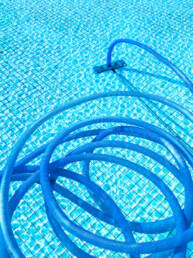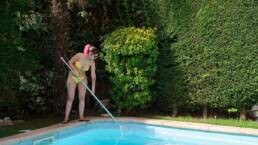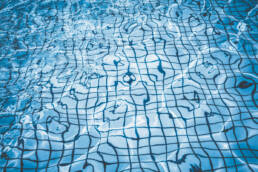Why Winterizing Your Pool Matters
Denver winters can be unforgiving, with freezing temperatures and occasional heavy snowfall. Neglecting to winterize your pool can lead to costly damage, including cracked pipes, damaged equipment, and unsightly stains. By taking the time to properly prepare your pool, you’ll not only save money in the long run but also extend the lifespan of your pool.
Properly preparing your pool for winter is a crucial step in ensuring it remains in top-notch condition during the cold months. Follow these steps diligently to safeguard your investment and make sure your pool is ready for the harsh Denver winter.
Cleaning the Pool
Before you start the winterization process, it’s essential to give your pool a thorough cleaning. Here’s how:
- Skimming and Vacuuming
Begin by skimming the surface of your pool to remove any floating debris such as leaves, twigs, and insects.
After skimming, use a pool vacuum to clean the bottom of the pool. This will remove any dirt or sediment that has settled there. - Removing Debris and Leaves
Take extra care to remove leaves and organic matter from the pool. Leaves left in the pool over winter can cause staining and promote the growth of algae.
A leaf net or skimmer net with a long pole can be incredibly helpful for this task.
Cleaning your pool at this stage not only ensures it’s aesthetically pleasing but also prevents debris from decomposing in the water, which can negatively impact water chemistry.
Balance Pool Water Chemistry
Properly balanced pool water is essential for preventing damage to your pool’s surfaces and equipment during the winter months. Here’s what you need to do:
- pH Levels
Test the pH levels of your pool water and adjust them if necessary. The ideal pH range is typically between 7.4 and 7.6.
Balanced pH levels prevent corrosion of pool components. - Alkalinity
Check the alkalinity of your pool water and make adjustments to keep it within the recommended range, typically between 80 and 120 parts per million (ppm).
Proper alkalinity levels help to stabilize the pH and prevent rapid fluctuations. - Chlorine Levels
Lower the chlorine levels in your pool to prevent excessive chemical interactions during the winter.
A chlorine level of around 1-3 ppm is generally sufficient for winter.
Balancing water chemistry before winterizing ensures that your pool water is not overly aggressive or corrosive, which can damage pool surfaces and equipment over time.
Lowering the Water Level
To protect your pool and its components from freeze-related damage, it’s important to lower the water level. Here’s how:
- Drain the water level in the pool to a point below the skimmer and return lines. Typically, lowering it by 12-18 inches is recommended.
- Reducing the water level prevents ice from expanding and causing damage to these components.
By lowering the water level, you reduce the risk of freeze-related damage to your pool’s circulation system, which can be costly to repair.
Draining and Storing Filters
- Drain the filter tanks and remove any water inside. You may also need to remove and clean the filter elements, depending on the type of filter you have.
- Store the filter elements indoors in a dry and temperature-controlled environment to prevent damage.
Protecting Pumps and Heaters
- Drain the water from the pump, filter, and heater. Be sure to follow the manufacturer’s instructions for your specific equipment.
- Cover the equipment with appropriate winterization covers or blankets to shield them from freezing temperatures and debris.
Properly winterizing your pool equipment ensures that it remains in good working condition and ready for use when you reopen your pool in the spring.
Protecting the Pool Structure
Your pool’s structure, including its walls, tiles, and coping, is a significant investment, and it’s essential to protect it during the harsh Denver winter. Here’s a detailed look at how to safeguard the pool structure:
- Covering the Pool
Installing a suitable pool cover is one of the most effective ways to protect your pool structure during the winter months. - Winter Pool Covers
These heavy-duty covers are designed to provide maximum protection during the off-season. They not only keep out debris but also help prevent algae growth by blocking sunlight. - Safety Covers
Safety covers not only protect your pool but also provide an added layer of safety by supporting the weight of a person or pet that might accidentally walk on the cover. - Proper Installation
Ensure that your chosen pool cover is installed securely. It should fit snugly over the pool and be anchored down to prevent it from being blown away by strong winds or heavy snow.
Benefits of Pool Covers
- Keeps out debris: A pool cover prevents leaves, twigs, and other debris from falling into the pool, reducing the cleaning effort needed in the spring.
- Reduces water evaporation: By covering your pool, you’ll minimize water loss due to evaporation, helping to maintain proper water levels.
Winterizing Pool Tiles and Coping
The tiles and coping around your pool are not only decorative but also structural elements that require attention during winterization.
- Before winter sets in, carefully inspect the pool tiles and coping for any signs of damage, cracks, or loose pieces.
- Address any issues promptly by repairing or replacing damaged tiles or coping stones.
- Take preventive measures to protect your pool’s tiles and coping from further deterioration during winter.
- Consider applying a pool-friendly sealant or coating to provide an additional layer of protection against freeze-thaw cycles.
Preventing Freeze Damage
Freezing temperatures can pose a threat to the pool structure, including its walls and the water within them. Here’s how to prevent freeze-related damage:
- Proper Winterization: Ensure that your pool has been properly winterized, including the lowering of the water level as discussed earlier.
- Protecting Pool Walls: To prevent freeze damage to pool walls, it’s essential to maintain proper water chemistry. Balanced water chemistry reduces the risk of plaster etching and scaling.
- Regular Inspections: Throughout the winter, periodically inspect your pool structure for any signs of damage or movement. Be vigilant for cracks, shifting, or any unusual changes in the pool’s appearance.
Properly winterizing your pool not only prevents damage but also saves you time and money on costly repairs and renovations in the future.
Preventing Ice and Snow Buildup
- Winterizing Pool Plumbing
Drain and blow out the pool lines, or use antifreeze to prevent freeze damage.
Don’t forget to plug return jets and skimmers. - Installing Pool Freeze Guards
Consider installing freeze guards to monitor and prevent ice buildup in your pool. - Regularly Monitor Water Levels:
Keep an eye on water levels during winter storms, and maintain proper levels to prevent damage.
Regular Maintenance During Winter
- Snow Removal
Periodically remove snow from the pool cover to prevent excess weight and damage. - Check Water Chemistry
Test and adjust water chemistry as needed during the winter months to prevent issues. - Inspect Pool Equipment
Regularly inspect pool equipment for any signs of damage or malfunction. - Address Issues Promptly
If you notice any problems, address them promptly to prevent further damage.
Winterizing your pool in Denver is a vital step in protecting your investment and ensuring many years of poolside enjoyment. At Laguna Pools, we’re here to assist you with all your pool service needs. For professional help in winterizing your pool or have any questions, don’t hesitate to reach out to us. Contact us today to schedule your pool winterization service and look forward to a pristine pool when summer returns.
Remember, a little preparation now goes a long way in preserving the beauty and functionality of your pool. Stay warm, Denver homeowners, and keep your pool safe this winter!

Ready for an expert opinion? Get in touch today!
Laguna Pools is a professional pool and spa contractor that has been servicing the Denver area for over 20 years. We offer routine cleaning and maintenance services, new pool design, construction, and remodeling.
Like this article? Spread the word!
Related Posts
August 29, 2024
How to Get Your Pool Ready for Fall and Winter: Essential Tips from Laguna Pools
Get your pool ready for fall and winter with expert tips! Learn how to protect your pool…
July 12, 2024
Summer Pool Maintenance Tips for Denver Homeowners
Keep your Denver pool in pristine condition all summer long with Laguna Pools'…
June 19, 2024
Dive into Excellence: Discovering Laguna Pools in Denver
Discover Laguna Pools in Denver, your premier choice for expert pool maintenance and…





